Getashen Quandary: What Can Villagers Do When Farming Is No Longer Viable?
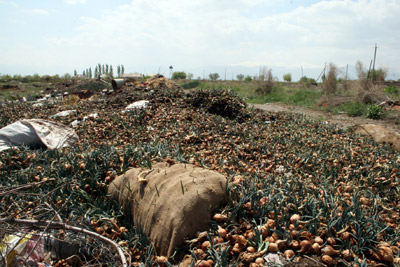 Sargis Khshtoyan, from Getashen, has unloaded several tons of onions harvested from his fields into the village garbage dump. Other farmers in Getashen have also dumped their onions here. You will mostly find onions imported from Iran in the stores and markets of Yerevan selling for 200-300 drams a kilo. It’s not important which parliament deputy or oligarch is importing the onions. It’s not difficult to find out and publicize their name. Nothing much will change if we do. The fact is that the Armenian villager cannot sell his onions at 40 drams. The fact remains that while we constantly hear about projects to turn Armenia into a paradise on TV, we are doing just about everything to wipe the Armenian village off the map.
Getashen lies a half kilometer from the Armenian-Turkish border in Armavir Marz. The community sits on 786 hectares of arable land in the Ararat plain. Refugees from Surmalou founded the community. Sargis Khshtoyan also traces his roots back to Surmalou
Sargis Khshtoyan, from Getashen, has unloaded several tons of onions harvested from his fields into the village garbage dump. Other farmers in Getashen have also dumped their onions here. You will mostly find onions imported from Iran in the stores and markets of Yerevan selling for 200-300 drams a kilo. It’s not important which parliament deputy or oligarch is importing the onions. It’s not difficult to find out and publicize their name. Nothing much will change if we do. The fact is that the Armenian villager cannot sell his onions at 40 drams. The fact remains that while we constantly hear about projects to turn Armenia into a paradise on TV, we are doing just about everything to wipe the Armenian village off the map.
Getashen lies a half kilometer from the Armenian-Turkish border in Armavir Marz. The community sits on 786 hectares of arable land in the Ararat plain. Refugees from Surmalou founded the community. Sargis Khshtoyan also traces his roots back to Surmalou
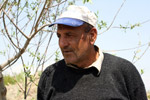 Sargis says that he and most of the other farmers trashed their onions because they couldn’t sell last year’s crop even at 30-40 drams. Sargis even left two tons of onions in the ground because he saw no sense in harvesting them. They have already sprouted and Sargis has decided not to plant anything this year in his 1.5 hectares of land.
We met Sargis working in his field. He was watering the section where grape vines grew. Despite the fact that he didn’t pay his water bill last year, water is so abundant this time of year that its use isn’t prohibited. Last year his water bill amounted to 80,000 drams ($215).
Sargis says that he and most of the other farmers trashed their onions because they couldn’t sell last year’s crop even at 30-40 drams. Sargis even left two tons of onions in the ground because he saw no sense in harvesting them. They have already sprouted and Sargis has decided not to plant anything this year in his 1.5 hectares of land.
We met Sargis working in his field. He was watering the section where grape vines grew. Despite the fact that he didn’t pay his water bill last year, water is so abundant this time of year that its use isn’t prohibited. Last year his water bill amounted to 80,000 drams ($215).
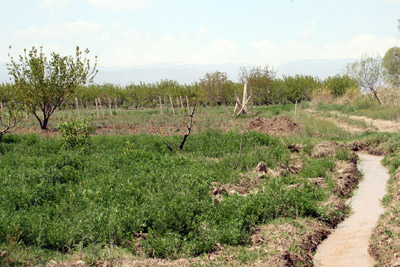 “They took me to court last year for non-payment. They came after me. They took all the villagers to court; about one hundred of us. If I could sell me crop, don’t you think that I’d pay?” Sargis asks, shrugging his shoulders in amazement. The 49 year-old farmer already is stooped at the waist.
“Last year I spent 11,000 drams on fertilizer. Now, I’m forced to buy on credit. The debt piles up and you can’t get out from under it. The government also gave me a loan but I couldn’t repay it so they cut me off. I couldn’t pay back the 230,000 to the bank because the onion crop sprouted in the field. Then my mother died. I kind of lost it there for awhile. They haven’t been giving any loans for two years now. There are many in the village facing the same predicament,” says Sargis. He spoke about his problems in a calm and collected manner, as if resigned to his fate.
Our village friend says that banks offer eight month loans. This means that the villager faces repayment even before he can harvest and sell his crop. Sargis believes that these terms are part of an official policy designed to force the villagers into a position of subservience.
This year, the residents of Getashen are pinning their hopes on the apricot and grape harvest. There is no threat of frost damage in Getashen. Sargis is already concerned about how he will sell his grape crop.
“Grape buyers haven’t signed any contracts this year. They have no money. The villagers are at their wits end,” Sargis says, adding that he hopes to at least sell his apricots even though they don’t allow villagers to enter the market with their produce.
“They took me to court last year for non-payment. They came after me. They took all the villagers to court; about one hundred of us. If I could sell me crop, don’t you think that I’d pay?” Sargis asks, shrugging his shoulders in amazement. The 49 year-old farmer already is stooped at the waist.
“Last year I spent 11,000 drams on fertilizer. Now, I’m forced to buy on credit. The debt piles up and you can’t get out from under it. The government also gave me a loan but I couldn’t repay it so they cut me off. I couldn’t pay back the 230,000 to the bank because the onion crop sprouted in the field. Then my mother died. I kind of lost it there for awhile. They haven’t been giving any loans for two years now. There are many in the village facing the same predicament,” says Sargis. He spoke about his problems in a calm and collected manner, as if resigned to his fate.
Our village friend says that banks offer eight month loans. This means that the villager faces repayment even before he can harvest and sell his crop. Sargis believes that these terms are part of an official policy designed to force the villagers into a position of subservience.
This year, the residents of Getashen are pinning their hopes on the apricot and grape harvest. There is no threat of frost damage in Getashen. Sargis is already concerned about how he will sell his grape crop.
“Grape buyers haven’t signed any contracts this year. They have no money. The villagers are at their wits end,” Sargis says, adding that he hopes to at least sell his apricots even though they don’t allow villagers to enter the market with their produce.
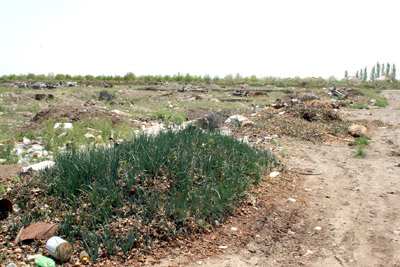 With an air of resignation Sargis says, “When you go to the city market they tell you that this is their spot and that you can’t sell your goods here.”
When we asked him what could be done to remedy the situation, Sargis proposed that the government offer farmers three year low rate loans,
Straining under the weight of debt, some villagers are ready to sell off their last remaining asset; their land. As Sargis puts it, the villagers “no longer have the desire or inclination” to work the land.
“I also worked as a chauffeur on the side. I sold my car and invested the money in the farm. I’m the only one left in the house. My wife works in Yerevan, baking bread. I invest the 60,000 she makes into the land as well,” Sargis tell us.
With an air of resignation Sargis says, “When you go to the city market they tell you that this is their spot and that you can’t sell your goods here.”
When we asked him what could be done to remedy the situation, Sargis proposed that the government offer farmers three year low rate loans,
Straining under the weight of debt, some villagers are ready to sell off their last remaining asset; their land. As Sargis puts it, the villagers “no longer have the desire or inclination” to work the land.
“I also worked as a chauffeur on the side. I sold my car and invested the money in the farm. I’m the only one left in the house. My wife works in Yerevan, baking bread. I invest the 60,000 she makes into the land as well,” Sargis tell us.
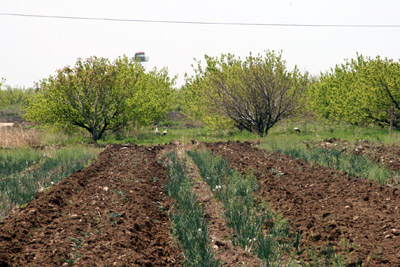 Sargis has grown used to living by himself. His wife only makes the trip back home once a week. Sometimes she only returns once a month. “I cook the meals – beans, omelets, and boiled fish. I’m getting the hang of it. I just don’t know how to clean the stuff. I’ll learn that as well over time. My three daughters are off and married. But they’re facing hard times as well, so they can’t help me out.”
Sargis sees his salvation coming in one of two ways. Either he can buy a tractor which will allow him to work the land without any additional expense, or he can sell his land. “Recently a guy with deep pockets came out here and saw my land. He offered me 2 million drams. But I’m 6000,000 in debt. What’s left after I pay it off? This guy has already bought 70 hectares in our village. I’ll probably sell and see what happens later. I’ve been fooling people for three years. If the grape and apricot crop is good I’ll pay them back and come out looking like a liar.”
Sargis has grown used to living by himself. His wife only makes the trip back home once a week. Sometimes she only returns once a month. “I cook the meals – beans, omelets, and boiled fish. I’m getting the hang of it. I just don’t know how to clean the stuff. I’ll learn that as well over time. My three daughters are off and married. But they’re facing hard times as well, so they can’t help me out.”
Sargis sees his salvation coming in one of two ways. Either he can buy a tractor which will allow him to work the land without any additional expense, or he can sell his land. “Recently a guy with deep pockets came out here and saw my land. He offered me 2 million drams. But I’m 6000,000 in debt. What’s left after I pay it off? This guy has already bought 70 hectares in our village. I’ll probably sell and see what happens later. I’ve been fooling people for three years. If the grape and apricot crop is good I’ll pay them back and come out looking like a liar.”
If you found a typo you can notify us by selecting the text area and pressing CTRL+Enter
 Videos
Videos Photos
Photos
Write a comment